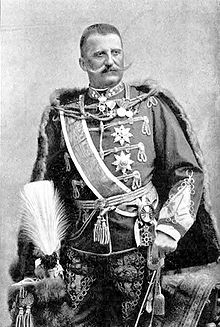Géza Fejérváry
Géza Baron Fejérváry von Komlós-Keresztes (born March 15, 1833 in Josefstadt , Bohemia , † April 25, 1914 in Vienna ) was a general , politician and Prime Minister of Hungary in 1905/06 .
Life
Fejérváry graduated from the Theresian Military Academy and became a lieutenant in 1851 . As captain of the General Staff, he took part in the Battle of Solferino for which he was awarded the Maria Theresa Order . In 1864 he led the 6th Infantry Regiment in the war against Denmark . In 1868 he became a lieutenant colonel . From 1872 to 1884 he served as State Secretary in the Honvéd Ministry and then until 1903 in the Hungarian Ministry of Defense. In 1875 Freiherr Fejérváry was appointed baron and member of the Hungarian magnate house . Since 1882 he also carried the title of Privy Council . In 1903 Fejérváry became Minister of Defense of Hungary, who successfully took care of the expansion of the Honvéd Landwehr . In addition, he was the commander of the Hungarian bodyguard .
Prime Minister
In the Hungarian parliamentary elections in 1905, the Liberal Party lost its majority for the first time since the compromise in 1867 , while the Independence Party under Franz Kossuth led a parliamentary majority. The main point of contention between the throne and the opposition was the abolition of the German language of command in the Joint Army .
As head of government of an official government on June 18, 1905 by King Ferenc József , Fejérváry faced a majority of opposition parties in the Budapest Diet . The opposition called the government unconstitutional because it did not come from a parliamentary majority. Therefore Fejérváry ruled with the help of the king, who adjourned parliament several times, bypassing parliament. The opposition then called for “national resistance” against the “gendarme government”, and recruitment and tax payments were refused in many counties . Fejérváry offered his immediate resignation, but the king refused.
Interior Minister Jósef Kristóffy , the actual head of the cabinet , then started negotiations with the social democrats and left-wing liberals, to whom he promised reforms in the electoral law and in the social policy area. The general suffrage planned by Fejérváry, however, endangered the power of the national aristocratic Magyar elite. An explosive domestic political climate arose in Vienna War Office were from General Beck plans developed ( "Fall U" for Hungary) quell a possible uprising in Hungary by force. On February 19, 1906, Franz Joseph and Fejérváry even had the parliament building occupied by the Honvéd. However, the mood in the population and civil servants gradually turned against the opposition and finally they agreed on the compromise candidate Sándor Wekerle as the new prime minister, which is why Fejérváry finally resigned on April 8, 1906.
He was a member for life in the Hungarian magnate house. He was also awarded the Grand Cross of the ku St. Stephen's Order .
literature
- Fejérváry from Komlós-Keresztes. In: Austrian Biographical Lexicon 1815–1950 (ÖBL). Volume 1, Verlag der Österreichischen Akademie der Wissenschaften, Vienna 1957, p. 294.
Individual evidence
- ↑ a b Fejérváry from Komlós-Keresztes. In: Austrian Biographical Lexicon 1815–1950 (ÖBL). Volume 1, Verlag der Österreichischen Akademie der Wissenschaften, Vienna 1957, p. 294.
- ↑ a b c d Géza Andreas von Geyr: Sándor Wekerle. 1848-1921. The political biography of a Hungarian statesman of the Danube Monarchy. (= Southeast European Works 91). Munich 1993, ISBN 3-486-56037-9 , p. 212ff.
- ↑ Erich Zöllner : History of Austria. From the beginning to the present. Verlag für Geschichte und Politik, Vienna 1990, ISBN 3-48646-708-5 , p. 434.
- ^ Alice Freifeld: Nationalism and the crowd in liberal Hungary, 1848-1914. Woodrow Wilson Center Press, Washington DC, 2000, ISBN 0-8018-6462-3 , p. 219.
- ↑ István Deák; Beyond nationalism. A social and political history of the Habsburg officer corps, 1848-1918. Oxford University Press, New York 1990, ISBN 0-19-504505-X , p. 70.
Web links
| personal data | |
|---|---|
| SURNAME | Fejérváry, Géza |
| ALTERNATIVE NAMES | Fejérváry of Komlós-Keresztes, Géza Baron |
| BRIEF DESCRIPTION | Austro-Hungarian general and politician |
| DATE OF BIRTH | March 15, 1833 |
| PLACE OF BIRTH | Josefstadt , Bohemia |
| DATE OF DEATH | April 25, 1914 |
| Place of death | Vienna |
